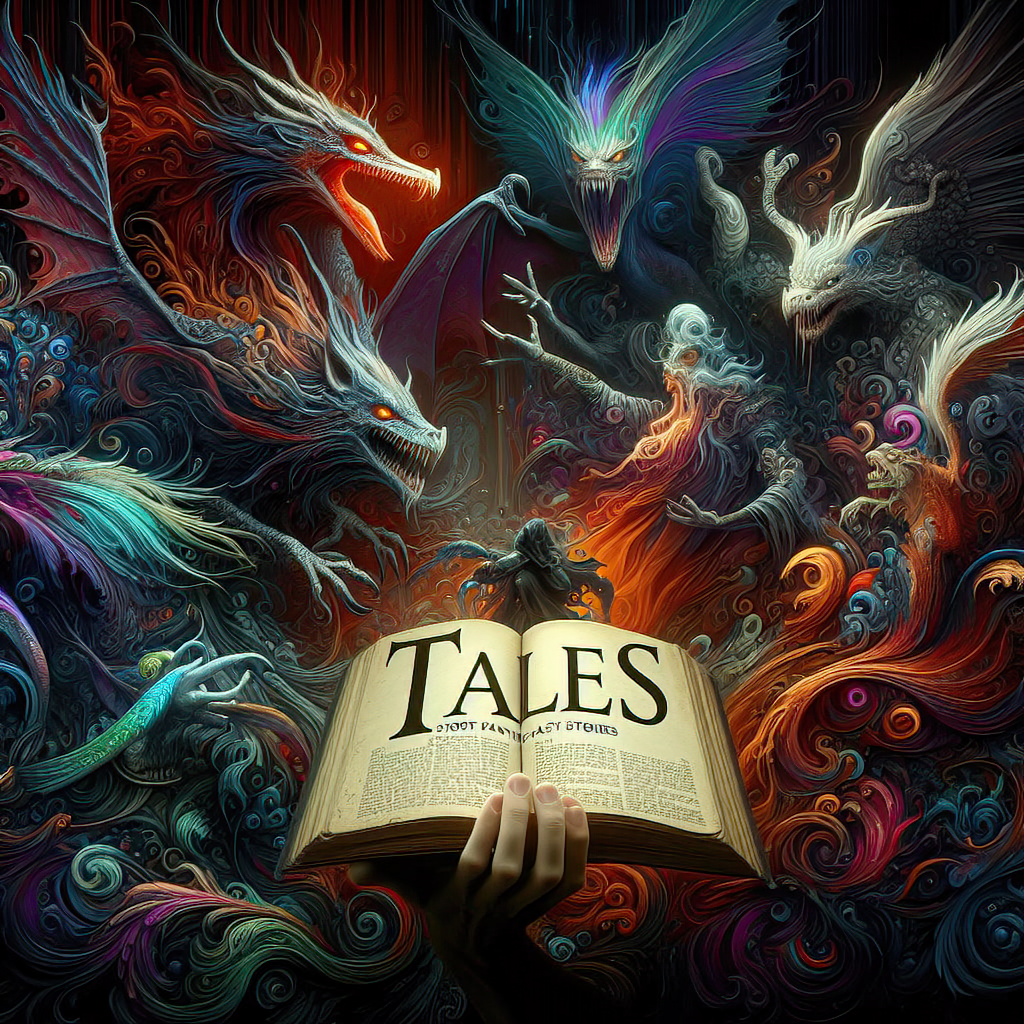
by Bill Tiepelman
Pale Messenger of the Void
There are names not spoken aloud in the village of Vareth’s Hollow—names so old they cannot be traced in any written tongue, only whispered beneath breath and buried under stones. Names like Keth-Avûn, the Void Binder. Names like Eslarei, the Feathered Curse. The last one was muttered only once in the living memory of any soul who dared remain in that place—on the night the white raven returned. The pedestal still stood on the hill, worn by rain and lichen but never crumbling, though none could remember who carved it. At its base, the runes had long since lost meaning to the common folk, etched deep in a language that fed on silence and blood. And on the winter solstice, when the moon hung lowest and the wind carried the smell of burnt marrow, the raven came back—its feathers bone-white, save for the glistening red streaks that seemed to weep from its own body. Eril Dane, the apothecary's orphaned son, had never believed the stories. A pragmatist raised on tinctures and the bitter bark of reason, he scoffed at tales of "void messengers" and "soul brands." But when the raven landed at dusk, painting the frozen air with the scent of iron and rot, he felt something shift in the marrow of his bones. It wasn’t just fear—it was recognition. His mother had vanished when he was eight, walking into the fog with a leather-bound book and a scar below her throat that he had never noticed before. That same sigil, the one etched behind the raven in ethereal red light, now burned in his memory—he had drawn it once, by instinct, into the dirt. The village priest struck him for it. The scar on Eril’s knuckles still flared in cold weather. That night, he climbed the hill. The white raven did not flee. Its eyes, black as cinder pits and rimmed with blood, regarded him like a judge too weary for mercy. Eril knelt. The sigil blazed behind the bird, painting him in spirals of ruinous light, and a voice—more thought than sound—pressed into his head: “One must remember before they can repent.” He fell into a dream deeper than sleep. There, he wandered a crumbling city of bone towers and red rivers, each building shaped like weeping faces. The raven followed him, now a creature of immense size and shadow, shedding drops of memory and blood alike. In the reflection of a blood-slick river, he saw himself—not as a boy, but as a man wearing robes stitched with runes and guilt. And the raven on his shoulder. When he awoke, hours had passed. The hill was empty. But carved freshly into the stone pedestal, beneath the old symbols, was one new word: Eril. The village would not understand. They would fear him. But he knew now—the raven had not returned for vengeance. It had come for an heir. Vareth’s Hollow did not ask questions. That was how the village survived. But as the days passed and the snows blackened with ash, they began to notice changes they could not ignore. Cattle were born with teeth. Wells whispered secrets when drawn at dusk. The children stopped dreaming—or worse, began to speak of the same dream: a tower of feathers and flame where a man in robes stood screaming, his mouth filled with birds. Eril Dane rarely left the apothecary cellar now. The once-sunny shop was shuttered, herbs wilting against the windowpanes. No one saw him eat. No one saw him age. What they did see—what terrified them more than they dared admit—was the raven. Always the raven. Perched on the crooked weather vane above the apothecary. Watching. Waiting. Growing. Its feathers were not so white anymore. They were beginning to smoke at the edges, feather-tips curling into shadow. And from its body, a soft red glow pulsed like a heartbeat. No one approached the hill again. Not after the dogs stopped barking, and not after the last priest walked into the woods barefoot, weeping, and did not come back. Eril wrote, always wrote. Pages and pages filled with symbols no one could decipher—scratched with clawed quills, stained with something darker than ink. He spoke with the raven, though no lips moved. And at night, his dreams cracked open like rotten eggs, spilling truths that smelled of burning stars and long-buried screams. He saw the first Binding, when the ancient ones flayed the sky and chained the Hunger between worlds. He saw the Feathered Seal, carved from the bones of extinct gods and offered in pact to keep the Void slumbering. He saw the betrayal. The arrogance. The forgetting. And he saw his mother… smiling, mouth stitched shut with sigils, eyes burned out by knowledge she’d swallowed whole. She had walked into the fog to feed the Binding. Her flesh, her memory, her name—offered freely, to keep the world stitched together for another generation. But she had failed. Something had shifted. A glyph misaligned. A promise broken. And the cost would now be paid in full… by her bloodline. The raven was not a messenger. It was a ledger. It had returned not to warn—but to collect. When Eril emerged, on the night of the black moon, he was not alone. His shadow was wrong—too tall, shaped like feathers in a storm, rippling as if caught in an eternal wind. His eyes glowed faintly red, not from within, but as though something behind them was peering out. Watching. Judging. The villagers gathered at a distance, compelled by fear, by awe, by the weight of something ending. He did not speak. He lifted his hand, and the raven spread its wings. From the pedestal behind them, the sigil flared once more—this time not in light, but in absence. A perfect hole in reality. A wound that would never heal. The air wept blood. The trees bowed as though in mourning. And one by one, the names of every soul who had ever whispered Eslarei’s name echoed into the hollow… and vanished. Erased. Devoured. Eril Dane became more than a man that night. He became the last sigil. The Living Bind. The One Who Remembers. His name would never again be spoken in Vareth’s Hollow, because the village no longer existed. The map burned itself clean. The roads rerouted. The stars refused to align above its former resting place. But in certain forbidden grimoires—pages written in feather-blood and sealed with breathless wax—there is still mention of a pale bird that heralds the Void. A raven, crowned in runes, that lands only once every thousand years upon the stone where memory dies. And when it does, it does not come for prophecy. It comes to feed. Epilogue Centuries passed. The world turned, forgetful as ever. Forests reclaimed the land. Dust buried truth. And still, the pedestal remained—unbroken, untouched, unseen. They called it the "Blind Stone" in the new maps, though none who passed it could remember why they avoided it, only that their hearts grew heavier the closer they came. Even satellite imagery blurred, as if something ancient reached through code and lens alike to keep itself sacred, veiled. Yet every so often, a white bird is spotted by travelers—solitary, silent, watching from a twisted tree or a crumbled stone, feathers too pale for nature, eyes too dark for peace. It does not fly. It simply waits. And for those few who dare sketch its form, or speak its sighting aloud, strange dreams follow. Dreams of towers made of mouths, of a man with a bleeding crown, of a name scratched in ash into the inside of their eyelids. Sometimes they wake with feathers in their hands. Sometimes, they don't wake at all. And in one forgotten corner of the world, where no birds sing and the wind moans in old tongues, the pedestal's runes flicker faintly—like a heartbeat beneath stone. A single word still burns upon it: “Eril.” If this story lingers in your bones and whispers through your dreams, you can now bring the legend home. Let the raven watch over your space, ward your rest, or shadow your thoughts with these evocative merchandise pieces. Drape your walls in the myth with a rune-bound tapestry, or summon the void’s elegance with a metal print worthy of arcane reverence. Sink into haunting comfort with a plush throw pillow, or let forgotten lore guard your dreams beneath a duvet cover woven with whispers. And if you wander, carry its omen with you in a tote bag etched in shadow.








